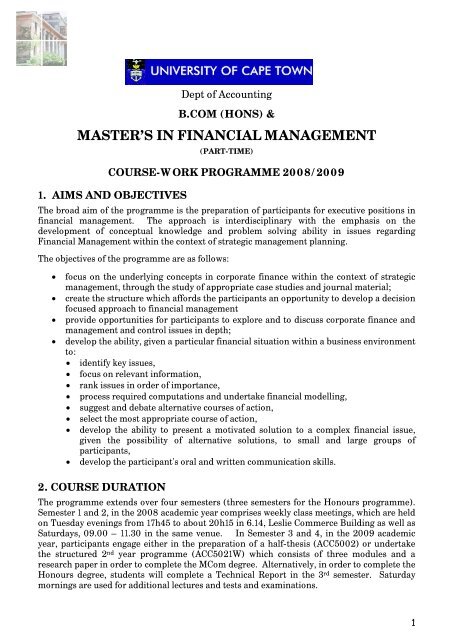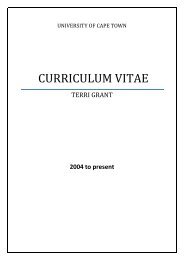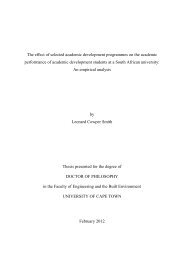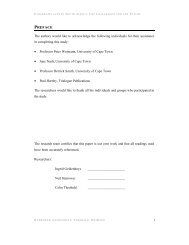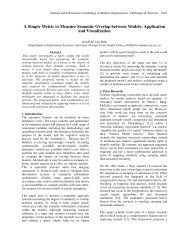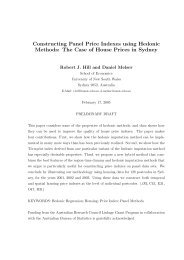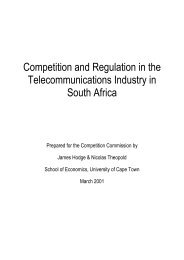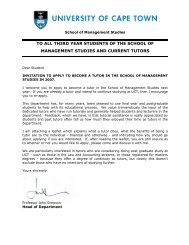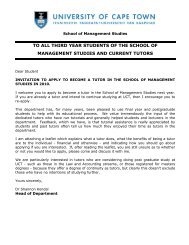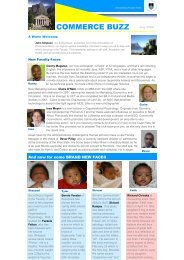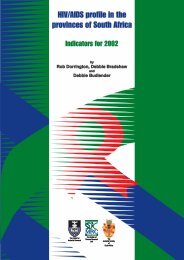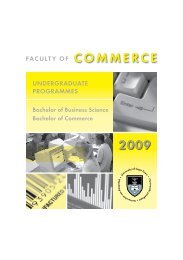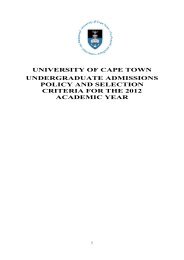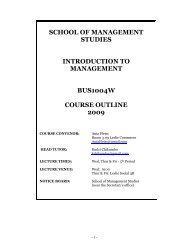Financial Management Honours
Financial Management Honours
Financial Management Honours
You also want an ePaper? Increase the reach of your titles
YUMPU automatically turns print PDFs into web optimized ePapers that Google loves.
Dept of Accounting<br />
B.COM (HONS) &<br />
MASTER’S IN FINANCIAL MANAGEMENT<br />
(PART-TIME)<br />
COURSE-WORK PROGRAMME 2008/2009<br />
1. AIMS AND OBJECTIVES<br />
The broad aim of the programme is the preparation of participants for executive positions in<br />
financial management. The approach is interdisciplinary with the emphasis on the<br />
development of conceptual knowledge and problem solving ability in issues regarding<br />
<strong>Financial</strong> <strong>Management</strong> within the context of strategic management planning.<br />
The objectives of the programme are as follows:<br />
• focus on the underlying concepts in corporate finance within the context of strategic<br />
management, through the study of appropriate case studies and journal material;<br />
• create the structure which affords the participants an opportunity to develop a decision<br />
focused approach to financial management<br />
• provide opportunities for participants to explore and to discuss corporate finance and<br />
management and control issues in depth;<br />
• develop the ability, given a particular financial situation within a business environment<br />
to:<br />
• identify key issues,<br />
• focus on relevant information,<br />
• rank issues in order of importance,<br />
• process required computations and undertake financial modelling,<br />
• suggest and debate alternative courses of action,<br />
• select the most appropriate course of action,<br />
• develop the ability to present a motivated solution to a complex financial issue,<br />
given the possibility of alternative solutions, to small and large groups of<br />
participants,<br />
• develop the participant's oral and written communication skills.<br />
2. COURSE DURATION<br />
The programme extends over four semesters (three semesters for the <strong>Honours</strong> programme).<br />
Semester 1 and 2, in the 2008 academic year comprises weekly class meetings, which are held<br />
on Tuesday evenings from 17h45 to about 20h15 in 6.14, Leslie Commerce Building as well as<br />
Saturdays, 09.00 – 11.30 in the same venue. In Semester 3 and 4, in the 2009 academic<br />
year, participants engage either in the preparation of a half-thesis (ACC5002) or undertake<br />
the structured 2 nd year programme (ACC5021W) which consists of three modules and a<br />
research paper in order to complete the MCom degree. Alternatively, in order to complete the<br />
<strong>Honours</strong> degree, students will complete a Technical Report in the 3 rd semester. Saturday<br />
mornings are used for additional lectures and tests and examinations.<br />
1
The proposed programme is as follows, but may be subject to change:<br />
• Semester 1 and 2: (2008 Academic Year)<br />
• Semester 3 & 4: (2009 Academic Year)<br />
Students are required to reregister at the beginning of the 3rd semester. Class, or individual<br />
sessions may be held to consider proposals for and/or discussions on Research Proposals.<br />
Staff will be available during this semester for assistance with Research Proposals. Students<br />
undertaking the 2 nd year structured programme (ACC5021W) will undertake three modules<br />
on Capital Markets, Advanced Corporate Finance and Strategic Cost <strong>Management</strong> - until the<br />
middle of September and will then be required to complete the research paper component of<br />
the programme.<br />
2008<br />
2009<br />
BCOM(HONS) ACC4009W ACC4009Z<br />
ACC5021W<br />
MCOM<br />
ACC5002W<br />
ACC5003W<br />
Students who register for the BCom (Hons) programme and achieve the required grade will<br />
be able to upgrade to the Masters programme in the second year.<br />
Attendance at all sessions is an essential requirement for continued permission to remain on<br />
the course and for registration. We do understand that your work commitments are<br />
important. However, attendance on Tuesday and Saturday is a priority. If you are going to<br />
miss a class, please email me with an explanation and go the extra mile for your group. Nonattendance<br />
will not be accepted without a detailed reason for such absence.<br />
3. COURSE CONTENT<br />
The programme has a decision making focus within a strategic context. Value creation and<br />
the principles of valuations are stressed throughout the programme.<br />
The content is organised in key areas:<br />
3.1 <strong>Financial</strong> Markets and Instruments<br />
The role of local and global financial markets and the array of financial instruments are<br />
analysed and evaluated in the context of the firm’s investment and financing decisions.<br />
3.2 Accounting Information, <strong>Financial</strong> Analysis and <strong>Financial</strong> Modelling<br />
Accounting data reflects the firm’s relationship between capital markets and investment<br />
opportunities, and the results of operations. The course focuses on interpreting this<br />
information for decision making. Forecasting financial statements and funding requirements<br />
are also covered as well as financial analysis and credit ratings.<br />
2
3.3 Time Value of Money, Risk and Return, the Cost of Capital and EVA<br />
These are key underlying concepts in the creation of value. It is not enough for firms to earn a<br />
profit, in order to add value the profit must exceed the firm’s cost of capital. The use of<br />
Economic Value Added as a measure of performance is evaluated.<br />
3.4 Capital Budgeting<br />
The analysis of long-term investments is crucial in maximising value, especially in situations<br />
of capital rationing and inflation. The evaluation of capital projects emphasises the tax<br />
implications, real options and the estimation of project cash flows.<br />
3.5 Working Capital <strong>Management</strong><br />
Firms invest substantial funds in working capital. Optimal working capital policies and<br />
current asset management can have a dramatic impact on the value of the firm.<br />
3.6 Source of Finance and Capital Structure<br />
Excessive use of debt can expose a firm to unacceptable levels of risk. Conversely,<br />
conservative debt policies may limit the opportunity for the leverage effect to increase wealth.<br />
How do firms select their debt/equity ratios Which sources of finance should firms use<br />
3.7 Valuation of Companies and Fixed Income securities<br />
The valuation techniques required to value equity and fixed income securities are<br />
fundamental to decision making in corporate finance and portfolio management. Topics<br />
include Yield to Maturity, Free Cash Flow, EVA, Growth models, net asset values and price<br />
earnings multipliers. The global environment, industry factors, macro-economic variables<br />
such as interest rates, as well as firm specific factors impact on the value of securities.<br />
3.8 Theory and Asset Pricing Models<br />
The efficiency (or lack thereof) of capital markets and the Modern Portfolio Theory has<br />
implications for the asset management. The Capital Asset Pricing Model and Arbitrage<br />
Pricing Theory are important to portfolio management. The Value versus Growth issue will<br />
be examined in the context of portfolio theory.<br />
3.9 Derivative Instruments, risk management and International Finance<br />
Options, futures, forward contracts, swaps and hybrid instruments are useful for hedging and<br />
have created challenges in management of risk and firm exposures. International finance is<br />
studied in relation to the investment and financing decisions of a firm operating in a global<br />
economy.<br />
3.10 Strategic Managerial Accounting<br />
<strong>Management</strong> accounting information is used for decision-making, planning and control<br />
activities. It supports the operational and strategic needs of a firm by providing measures of a<br />
firm’s economic condition, such as the cost and profitability of a firm’s products, services and<br />
customers. Insightful cost analysis enables the firm to learn about its strategic focus and the<br />
long-term sustainability of its products, divisions and other activities. The focus is on activity<br />
based management, supply chain management, the balanced scorecard, benchmarking and<br />
cost estimation.<br />
4. KEY ELEMENTS<br />
The course provides an integrated package built around a number of key elements, each of<br />
these supports and is supported by the other elements. No part of the programme stands<br />
alone and students are expected to participate fully in each.<br />
3
4.1 Participants<br />
The course is designed to assist participants in achieving the course objectives previously<br />
stated, while allowing sufficient scope for individuals to achieve personal objectives. Those<br />
invited to join the programme will be selected because it is believed that they have something<br />
to offer to, as well as gain from the course. A candidate who does not provide the expected<br />
input is a drain on the whole programme.<br />
4.2 Working Groups<br />
The class will be divided into groups of between 3 and 5 students. The objective of the<br />
working group is to simulate organisational behaviour. Various people in an organisation will<br />
observe clues to problems and will propose action: in the working group the participant<br />
should develop reasoning and persuasive abilities and also the ability to draw on the<br />
knowledge, experience and perceptions of others in the group. Groups prepare material for<br />
each session of the full class and will also be allocated group assignments. Working groups<br />
normally meet once a week at a time convenient to the group members. Many corporate<br />
finance assignments in practice revolve around teams. The course reflects the new corporate<br />
reality.<br />
4.3 Case Studies<br />
The Programme follows the Harvard Business School approach of making extensive use of<br />
case studies. The objective of a case study is to simulate real financial management<br />
situations. Good case studies will therefore have a certain level of "noise", which is irrelevant,<br />
distracting or misleading information, and also clues to various problems. These relevant<br />
problems then compete for priority. The task of the group is:<br />
• to eliminate the "noise",<br />
• identify the relevant problems,<br />
• rank them in order of priority,<br />
• research the finance theory and literature relevant to these problems,<br />
• identify alternative courses of action,<br />
• propose and motivate the preferred alternative.<br />
Case study work forms the core of the programme. The typical procedure for case study<br />
preparation will be as follows: the individuals in the group will analyse the case and research<br />
material where appropriate. They will then formulate a written solution. They will then meet<br />
in the working groups to exchange, propose and debate their views. A group member will<br />
document its conclusions and supporting arguments. This document is typed, including a<br />
bibliography and is submitted by about noon on the day prior to the class meeting where the<br />
case is to be discussed. Included in the document will be an executive summary (maximum<br />
one page), which may be distributed to the full class at the appropriate time. Each Group can<br />
email me their submission but please set out the worksheets in such a way that it is easy to<br />
print. Always identify your Group in file names.<br />
In addition, a spokesperson will be appointed by the working group to present their views on<br />
the case at the full class meeting. It is mandatory that the functions of spokesperson be<br />
rotated through the working group. However, I will retain the right to call on anyone to open<br />
a case. No other mandatory rules apply to working groups. It is essential that all students<br />
prepare for and participate in each case study. Abdication in favour of the spokesperson will<br />
devalue the quality of solutions and defeat the function of the case. It is critical that all<br />
members are fully prepared as I will call on any student within a group to answer a question.<br />
At the full class meeting a group will be selected and the spokesperson for that group will<br />
present their views. Other groups will also be given an opportunity to present their case.<br />
4
General discussion and questions will proceed. Circumstances may however require this<br />
procedure to be altered on occasions.<br />
4.4 Class Meetings<br />
Besides the presentation of assignments and discussion papers, weekly class meetings serve<br />
to create learning experiences for the class as a whole. They are conducted in various modes<br />
of which the following are the most frequent.<br />
• Case Study. The session is used for presentation of case study findings and discussion<br />
of the issues which arise.<br />
• Unstructured Seminar. This results from students being given a topic to research. On<br />
arrival at the class meeting, a chairperson is appointed, a framework for discussion is<br />
agreed and the topic is discussed, drawing on the reading and research of the whole<br />
group.<br />
• Structured Seminar. This combines the features of a lecture conducted by a staff<br />
member with specific preparation based on prescribed readings.<br />
• Guest Speakers. On occasions, visiting speakers with specialist expertise are invited to<br />
address the class.<br />
4.5 Assignments:<br />
The objective of assignments is to develop the participant's ability to:<br />
• perform limited research on a specific issue;<br />
• to present varied opinions thus obtained into a succinct summary; and,<br />
• to select and justify conclusions.<br />
The group assignments have the added objective (as with case studies) of developing the<br />
participant's reasoning and human relations skills.<br />
An individual discussion paper and/or research proposal is required and a group valuation<br />
research project is also required to be undertaken during the programme. We make extensive<br />
use of Adobe and your submissions should be in PDF format. All references should be<br />
properly acknowledged and a full bibliography should be provided. Assignments are spread<br />
throughout Semester 1 and 2. In general, marks will be awarded for content (adequacy of<br />
coverage, analysis and research) and structure (clarity, logic, strength of conclusions). Marks<br />
may be lost for poor presentation (typographical errors, defective bibliography, poor layout).<br />
4.6 Tests and examinations<br />
A series of examinations will be held during the year and usually after each section.<br />
Participants will only be permitted to bring limited reference material into examinations. In<br />
some modules, students will not be able to bring in any materials. The examinations will<br />
primarily take the form of short case studies or problems and may include questions on cases<br />
covered in the programme. The scheduled dates for the tests and examinations are set out in<br />
the programme.<br />
4.8 Reference Material<br />
The reference material is drawn mainly from three sources. Firstly, prescribed texts, which<br />
provide a basic reference document on selected issues. Secondly, the libraries with vast<br />
resources of books and journals (access is available to the Jagger Linear Library and UCT’s<br />
electronic database resources). Thirdly, it is expected of students to remain current with<br />
5
eporting in the local financial press. It is included in the objective of the course that<br />
participants should develop the ability to find relevant reference material from the library and<br />
other sources.<br />
The prescribed texts which should preferably be purchased are:<br />
• Brigham, Eugene F, & Davies Phillip R, Intermediate <strong>Financial</strong> <strong>Management</strong>, Seventh<br />
or Eighth Edition. Otherwise, order any Intermediate <strong>Financial</strong> <strong>Management</strong> or<br />
Corporate Finance Textbook. Damodaran’s Corporate Finance – Theory & Practice is<br />
recommended.<br />
• Correia, Flynn, Uliana & Wormald, <strong>Financial</strong> <strong>Management</strong>, 6 th ed., Juta & Co.<br />
• Bruner, Robert F, Case Studies in Finance - Managing for Corporate Value Creation,<br />
Irwin McGraw-Hill, 5 th Edition<br />
• Van Zyl, C. Botha, Z. & Skerrit, P. Understanding South African financial markets,<br />
2006, 2 nd ed., Van Schaik Publishers<br />
5. COURSE ASSESSMENT FOR HONOURS & MASTERS<br />
The coursework component, which includes case study submissions, examinations and tests,<br />
and assignments, will count 50% of the total grade over the two years and the half-thesis<br />
(ACC5003W) or the 2 nd year structured programme (ACC5021W) will count 50%. The<br />
assessment will be structured as follows for the <strong>Honours</strong> and Masters students;<br />
2008 <strong>Honours</strong> Masters Masters<br />
ACC4009/5002 ACC4009W/Z ACC5003 ACC5021<br />
Examinations 36.0% 27.0% 18.0% 18.0%<br />
Valuation research project 34.0% 25.5% 17.0% 17.0%<br />
Group Casework submissions 30.0% 22.5% 15.0% 15.0%<br />
100.0% 75.0% 50.0% 50.0%<br />
Technical report 25.0%<br />
Half-thesis 50.0%<br />
Module 1 10.0%<br />
Module 2 10.0%<br />
Module 3 10.0%<br />
Research paper 20.0%<br />
100.0% 100.0% 100.0% 100.0%<br />
The following criteria must be met in order to be awarded the degree:<br />
• In each category of assessment a sub-minimum of 45% must be achieved.<br />
• An aggregate of 50% overall must be achieved.<br />
6
6. UPGRADING FROM THE HONOUR’S TO MASTER’S DEGREE<br />
All candidates, who do not have <strong>Honours</strong> equivalent degrees, will be required to register for<br />
the B Com (Hons) degree initially. All candidates will then pursue the abovementioned<br />
course-work in the first and second semesters (that is, in the first year of their studies). At the<br />
end of the course-work component, the Department will select candidates who will be offered<br />
the option of upgrading to the Master’s degree; those candidates who are not offered this<br />
option, or those who may be offered this option but who elect not to accept the offer, will then<br />
proceed with their Technical Reports for the completion of the B Com (Hons) degree. Those<br />
who accept the upgrade option will proceed with the preparation and writing of their Master’s<br />
thesis in 2009 under supervision or will proceed to undertake the 2 nd structured programme<br />
(ACC5021W). In order to upgrade to the Master’s degree, a student will be required to achieve<br />
a weighted average mark of 60% for the examinations component of the first year’s<br />
programme.<br />
7. PROGRAMME DIRECTORS<br />
The programme director will be Professor Carlos Correia; all enquiries should be directed to<br />
him on (021) 650 3144 or 650 2265. The fax number is (021) 689 7582. The e-mail address<br />
is arete@telkomsa.net 0r Carlos.Correia@uct.ac.za. Dr Glen Holman is director of the second<br />
year of the programme and his email address is Glen.Holman@uct.ac.za. All enquiries in<br />
respect to the supervision of your thesis and research methodology should be directed to Dr<br />
Richard Chivaka at 650-4391 or Richard.Chivaka@uct.ac.za.<br />
7
Programme Outline<br />
DAY DATE PRESENTATION<br />
Tuesday<br />
19-Feb<br />
Registration and welcome – Introduction to the course / Admin /Overview of Case Studies /<br />
Introduction to Investing<br />
MODULE 1: <strong>Financial</strong> Analysis<br />
Course leaders: Prof. Carlos Correia and Prof. Mark Graham<br />
CC<br />
Tuesday 26-Feb Business Strategy Analysis, Accounting Analysis & <strong>Financial</strong> Analysis CC<br />
Tuesday 04-Mar Value Creation - Case: 1 Warren Buffet - 1995 & 2005 CC<br />
Tuesday 11-Mar Investment Analysis by Roddy Sparks - ex-CEO of Old Mutual CC<br />
Tuesday 18-Mar Case: The Home Depot CC<br />
Tuesday 25-Mar Case 7: The Body Shop International PLC2001: An Introduction to <strong>Financial</strong> Modelling CC<br />
Tuesday 01-Apr Case: Harnischfeger (PH) CC<br />
Tuesday 08-Apr Case 5: The Battle for Value: Federal Express vs. United Parcel Service- 2004 CC<br />
Tuesday 15-Apr <strong>Financial</strong> Statement Analysis & International <strong>Financial</strong> Reporting Standards (IFRS) MG<br />
Saturday 19-Apr <strong>Financial</strong> Statement Analysis & International <strong>Financial</strong> Reporting Standards (IFRS) MG<br />
Tuesday 22-Apr <strong>Financial</strong> Statement Analysis & International <strong>Financial</strong> Reporting Standards (IFRS) MG<br />
Saturday 26-Apr <strong>Financial</strong> Statement Analysis & International <strong>Financial</strong> Reporting Standards (IFRS) MG<br />
MODULE 2: Capital Budgeting<br />
Tuesday 29-Apr<br />
Advanced Capital Budgeting [Brigham & Daves Ch11&12, Correia, Flynn, Wormald & Uliana Ch8,9<br />
&10]<br />
CC<br />
Saturday 03-May<br />
Lecture: Capital Budgeting - Risk Analysis & Monte Carlo Simulation [Case: Mozal Smelter - BHP<br />
Billiton]<br />
CC<br />
Tuesday 06-May Case 22 Genzyme /Geltex Pharmaceuticals CC<br />
Saturday 10-May Exam 1 (Modules 1 and 2)<br />
MODULE 3: Capital Structure and Cost of Capital<br />
Tuesday 13-May<br />
Miller Modigliani and Introduction to Capital Structure<br />
Case: Introduction to Debt Policy and Value<br />
PC<br />
Tuesday 20-May Case 31: Polaroid Corporation, 1996 PC<br />
Saturday<br />
24-May<br />
Case 12: Best Practices in Estimating the Cost of Capital: Survey and Synthesis. Readings and research<br />
on the Cost of Capital in South Africa.<br />
Tuesday 27-May Case 14: Coke vs. Pepsi, 2001 PC<br />
Tuesday 03-Jun Case 15: Teletech Corporation 2005 MW<br />
MODULE 4: Valuations<br />
Saturday 07-Jun Introduction to Valuations [Theory, Price multiples, Dividend growth and EVA] CC<br />
Tuesday 10-Jun Free Cash Flow Valuation Techniques -1 CC<br />
Thursday 12-Jun Free Cash Flow Valuation Techniques- 2 CC<br />
Tuesday 17-Jun Case: Calaveras Vineyards (see webpage) CC<br />
Tuesday 24-Jun Case 44: Palamon Partners/ Teamsystem S.P.A CC<br />
VACATION<br />
PC<br />
CC Prof. Carlos Correia CS Colin Smith MG Prof. Mark Graham<br />
GH Dr. Glen Holman PC Peter Cramer EU Prof. Enrico Uliana<br />
RC Prof. Richard Chivaka MW Prof. Mike Wormald<br />
8
Five Day program on Corporate Finance, Accounting, Valuation & Corporate Finance<br />
Wednesday 16-Jul The Accounting Model vs the Economic model of the Firm Joel Stern<br />
Thursday 17-Jul Three Basic Valuation Models Joel Stern<br />
Tuesday 22-Jul Three Basic Valuation Models (continued) Joel Stern<br />
Wednesday 23-Jul Corporate Governance Joel Stern<br />
Thursday 24-Jul The Capital Structure Decision Joel Stern<br />
MODULE 5: Capital Markets & <strong>Financial</strong> Instruments<br />
Tuesday 29-Jul Interest Rates, Inflation and the Role of the Central Bank GH<br />
Saturday 02-Aug Fixed Income I, Duration, DV01, and Convexity GH<br />
Tuesday 05-Aug Fixed Income II, Bond Pricing, FRA’s, Bond Investing GH<br />
Tuesday 12-Aug Currencies, Spot markets, Purchasing Power Parity GH<br />
Saturday 16-Aug Currency Forwards GH<br />
Tuesday 19-Aug Currency Futures, RMA, Emerging Market Currencies, Contagion GH<br />
Saturday 23-Aug Derivatives I, Other Futures, Forwards GH<br />
Tuesday 26-Aug Derivatives II, Options—valuations and strategies GH<br />
Saturday 30-Aug Derivatives III, Swaps, CFD’s, Financing, BEE Case Study GH<br />
Tuesday 02-Sep Asset <strong>Management</strong> I, CAPM, Efficient Frontier GH<br />
Saturday 06-Sep Asset <strong>Management</strong> II, Hedge funds, Immunization GH<br />
Tuesday 09-Sep World Bank, IMF, SAA Case Study GH<br />
Saturday 13-Sep Barings and MGS Case Study /Soc Gen. and Final Exam Preparation GH<br />
Saturday 20-Sep Exam 2 (Module 5)<br />
MODULE 6: Special Topics in Finance<br />
Tuesday 16-Sep Dividend Policy – Textbook plus readings CS<br />
Tuesday 23-Sep Case24: Eastboro Machine Tools Corporation CS<br />
Tuesday 30-Sep Case 26: JetBlue Airways, IPO Valuation. CS<br />
Saturday 04-Oct Securitisation & Share Buy-backs CC<br />
Tuesday 07-Oct Private Equity in South Africa: A Venfin perspective by Jannie Durand<br />
Tuesday 14-Oct BEE Financing Structures RG<br />
Saturday 25-Oct Exam 3 (Modules 3, 4 and 6)<br />
Tuesday 28-Oct Presentations - Valuation Projects CC<br />
Saturday 01-Nov Presentations - Valuation Projects CC<br />
Tuesday 04-Nov Research Methodology RC<br />
Saturday 08-Nov Research Methodology RC<br />
9


